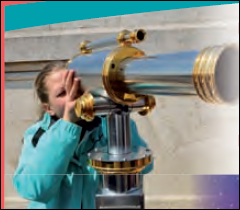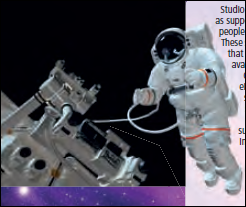Unit 6
Speaking
1 Work in pairs. Make a list of all the subjects that students can study at your school.
History, Maths, English language, Arabic language, Religion, Science....etc.
2 Look at the photographs and guess which special subjects students study at this secondary school in England.


The photographs suggest that the special subjects that students study at the secondary school in England have something to do with space. I think it is likely that they study Astronomy and Astrophysics.
Reading
3 Read the newspaper article and check your answers.
|
Studio schools are pioneering schools which receive funding as well as support from private businesses, and which seek to encourage young people to undertake a less conventional form of secondary education. These schools often specialise in one specific area, whilst understanding that the same broad range of skills and qualifications should be made available to all young people. One such school has recently opened to educate fourteen- to eighteen-year-olds who have a special interest in working in the space industry. Students follow a tailor-made curriculum at the school, including subjects such as Astronomy and Astrophysics. Lessons are a mixture of small-class tutorials, with projects supervised by leading companies in both the space and technology industries. Prominent scientists and engineers are brought in as guest lecturers, with students aiming to achieve top grades in their Math and Science exams. When they leave school, they will be well-placed to take any number of different career paths. ‘They don’t have to become astronauts!’ says a spokesperson for the school. ‘Excellent grades in science and technology subjects can open many doors and lead to a variety of career opportunities.’ |
Keywords
|
Words |
Meanings in English |
|
Pioneering |
Introducing new and better methods or ideas for the first time |
|
qualifications |
Official records of achievement awarded upon the successful completion of a course of training or passing an exam |
|
undertake |
to commit yourself to do something and to start to do it |
|
astrophysics |
The study of the chemical structure of the stars and the forces that influence them |
|
tutorial |
a period of intensive teaching and discussion given by a tutor to an individual student or a small group of students |
|
tailor-made |
Custom-made; made to fit exactly |
| Studio schools are pioneering schools which receive funding as well as support from private businesses, and which seek to encourage young people to undertake a less conventional form of secondary education. These schools often specialise in one specific area, whilst understanding that the same broad range of skills and qualifications should be made available to all young people. |
The characteristics of studio schools:
- Funded and supported by private businesses.
- Encourage young people to undertake a less conventional form of secondary education.
- Specialised in one specific subject.
- Focus on skills and qualifications.
The aim of studio schools is to encourage young people to undertake a less conventional form of secondary education.
The underlined relative pronoun (which x2) refers to studio schools.
Studio schools are funded by private businesses.
Studio schools are supported by private businesses.
One such school has recently opened to educate fourteen- to eighteen-year-olds who have a special interest in working in the space industry. Students follow a tailor-made curriculum at the school, including subjects such as Astronomy and Astrophysics.
An example of a studio school is a school opened for students whose interest is in working in the space industry.
Students aged between fourteen and eighteen could attend this school.
Examples of subjects taught in this school are:
- Astrophysics
- Astronomy
The curriculum at this school is specially designed to meet the needs of the students.
The underlined relative pronoun 'who' refers to fourteen- to eighteen-year-olds.
| Lessons are a mixture of small-class tutorials, with projects supervised by leading companies in both the space and technology industries. Prominent scientists and engineers are brought in as guest lecturers, with students aiming to achieve top grades in their Math and Science exams. When they leave school, they will be well-placed to take any number of different career paths. ‘They don't have to become astronauts!’ says a spokesperson for the school. ‘Excellent grades in science and technology subjects can open many doors and lead to a variety of career opportunities.’ |
The lessons in the space school are different small-class tutorials with projects.
The projects are supervised by leading companies in space and technology industries.
Engineers and prominent scientists are brought as guest lecturers.
Students in the space school aim to achieve top grades in their Math and Science exams.
The top grades will enable the students to choose from different career paths.
The importance of achieving excellent grades in Science and technology courses is:
to open many doors and lead to a variety of career opportunities.
The underlined pronoun 'their' refers to students'.
The underlined pronoun(they x3) refers to students.
Vocabulary and speaking: page 47, exercise 6
keywords
|
Words |
Meanings in English |
|
Agriculture |
The science or practice of farming |
|
Economics |
The study of the way in which money and goods are produced and used |
|
Linguistics |
The study of the grammar, history and structure of languages |
|
Engineering |
The study of how roads, bridges, machines, etc. |
|
Pharmacy |
The study and practice of preparing drugs or medicines |
|
Psychology |
The study of the mind and how it works |
|
Law |
The study of legal system |
|
Sociology |
The study of societies and the behaviour of people in groups |
|
Business management |
An area of study which involves learning about running a company, in areas like controlling, leading, monitoring, organizing and planning |
|
Marketing |
The study of selling products to the appropriate customer |
|
History |
The study of ancient and modern civilizations |
6 Work in pairs. Discuss the subjects that you are interested in studying at university. Which subjects fit into the categories Sciences, Arts and Humanities, or Business? Which are more difficult to classify?
|
Maths Dentistry Arabic Language and Literature Pharmacy Marketing Geology Psychology Translation Visual Arts Chemistry Sociology Banking and Finance History Nursing Agriculture Physics Engineering Linguistics Economics Business Management Biology Medicine Geography |
Answers
Sciences: Maths, Dentistry, Pharmacy, Geology, Chemistry, Agriculture, Physics, Engineering, Biology, Medicine
Arts and Humanities: Arabic Language and Literature, Translation, Visual Arts, Sociology, History
Business: Marketing, Banking and Finance, Economics, Business Management
Subjects that are more difficult to classify:
Psychology, Nursing, Linguistics and Geography are more difficult to classify, because they involve elements of study from more than one category. For example, Linguistics involves scientific knowledge and critical theory.
Listening:page 47,exercises 7 and 8
7 Listen to a career advisor answering students' questions about university courses. What do the students ask?
A career adviser is someone who provides information to help people to make choices about their training and work.
|
Audioscript Student 1 Hi, I'm thinking of studying Law at a university in Jordan. Can you tell me what I need to know about it before I make that decision? Career advisor: You will be expected to do a lot of work outside the classroom, and you need to be very highly motivated. Moreover, whatever subjects you take in school, you will need to do very well in. Traditional academic subjects like History, English and Social Studies are good places to start. You will be doing a lot of essays at university, so any subjects that require essay writing will be useful. Does that answer your question? Student 1 Yes, thank you! Student 2: I’ve got a question. I'd like to study Dentistry at the Jordan University of Science and Technology. My favourite subjects at school are Biology, Chemistry and English. I’m also doing Maths, of course, but I'm not that good at it. If I drop it, will my chances of getting into Dentistry be badly affected? Career advisor: Biology and Chemistry are the most important subjects if you want to go on to study Dentistry at university. Maths is not as important, but it is compulsory and I would strongly recommend that you work harder on this subject because you cannot drop it. The most important thing to remember is that, like Law, to do Dentistry you need to be fully committed to hard work! Expect to be in classes or doing practical work for eight hours a day, five days a week. Dentistry students work extremely hard. Any more questions? |
What do the students ask?
Answers
Student 1 asks what she needs to know before deciding whether or not to study Law.
Student 2 wants to know if he has to study Maths at school to get onto a Dentistry course.
Student 3 wants to know if she can do Business Management if she doesn't study Maths at school.
8 Listen again and complete the information in the table.
|
Useful subjects |
Is Math necessary? |
|
|
Law |
History, English, Social Studies |
No |
|
Dentistry |
Biology, Chemistry |
Not vital but strongly recommended |
|
Business Management |
Economics, Business Studies, ICT, History, foreign languages |
Not vital but strongly recommended |

